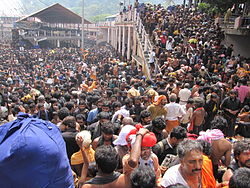Makaravilakku
This article needs additional citations for verification. (September 2014) |

Makaravilakku is an annual festival held on Makara Sankranti in Kerala, India at the shrine of Sabarimala. The festival includes the Thiruvabharanam (sacred ornaments of Lord Ayyappan) procession and a congregation at the hill shrine of Sabarimala. An estimated half a million devotees flow to Sabarimala every year to have a darshan (vision) of this ritual this day.
Legend[edit]
Lord Sri Rama and his brother Lakshmana met Sabari, a tribal devotee, at Sabarimala. Sabari offered the Lord fruits after tasting them. But the Lord accepted them gladly and whole-heartedly. The Lord then turned and saw a divine person doing tapas. He asked Sabari who it was. Sabari said it was Sasta. Rama walked towards Sasta and the latter stood up to welcome Rama. The anniversary of this incident is celebrated on Makara Vilakku day.
Agents behind the Makaravilakku[edit]
Makaravilakku, is a part of a religious ritual that is practiced in the past by the Malayaraya tribe who are believed to be the descendants of Malayaman Kaari in the forest of Ponnambalamedu (the place where Makaravilakku appears) and then later secretly continued by The Travancore Devaswom Board (TDB).[1] There is nothing supernatural in the Makaravilakku. It has been a practiced for more than hundreds of years by the tribes.[2] Actually there is a temple in the Ponnambalamedu, the place is not open to the public it is under the control of Forest department of Kerala. When the Sirius star appears in the sky on Makaram 1st, these tribes too perform their rituals in that temple. Like in the temple of Sabarimala they also perform Arathi encircling the fire around the Idol. It is performed by lighting camphor and ghee in a vessel and is circled around the idol 3 times. This lamp or fire is what we see from the Sabarimalai temple and call it Makara Jyothi but the fire in the Ponnabalamedu is the actual Makaravilakku. The holy Light... "The Jyothi is a star that appears on the skies on the Makarasamkrama day above the Ponnambalamedu towards the eastern direction of Sabarimala. The lamp lighted during the time of Deeparadhana (arati) in the temple is known as Makara Vilakku," .
Makarajyothi: The Sirius Star[3] Makaravilakku: The Arathi that performed by The tribes and later continued by The Travancore Devaswom Board (TDB)
The Makaravillakku can be seen from Sannidhanam, Pandithavalam, Pulmedu, Hilltop, Chalakayam, Attathodu, Saramkuthi, Neelimala, Marakootam, Panjipara.[4]
The name refers to the lighting of a bright "vilakku" (lamp) three times atop Ponnambalamedu[5] the sanctum sanctorum of Sabarimala, which were used to communicated the completion of Deeparadhana[clarification needed] in Ponnampalamedu[clarification needed] (and compare Makara Jyothi).
References[edit]
- ↑ "Nothing celestial about Sabarimala's divine flame; it's man-made - Firstpost". Retrieved 22 September 2015.
- ↑ "Makarajyothi is man-made, aver leaders". The Hindu. 21 January 2011. ISSN 0971-751X. Retrieved 22 September 2015.
- ↑ Special Correspondent (24 January 2011). "Makarajyothi is a star: senior Thantri". The Hindu. Retrieved 18 January 2014.
- ↑ K, Kandaswamy. "Makara Jyoti, Makaravillakku Date This Year". Live Trend. K Kandaswamy. Retrieved 23 November 2017.
- ↑ "The light on Markarsamkarama day an 'aarti'". Zee News India. 7 January 2012. Retrieved 16 January 2013.
